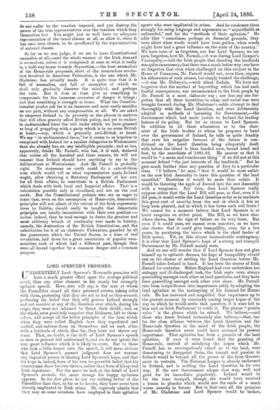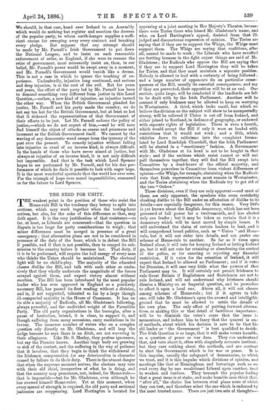LORD SPENCER'S PROMISES.
UNDOUBTEDLY Lord Spencer's Newcastle promises will have a much greater effect upon the average political
mind, than any other element in his manly but strangely optimist speech. Here, men will say, is the man at whom the Parnellites aimed all their poisoned arrows, taking sides with them, protesting that they are not so bad as they seemed, professing his belief that they will govern Ireland strongly and not connive at any of the disorders over which, during his reign, they were not ashamed to throw their shield; and, on the whole, even positively sanguine that Irishmen, left to them- selves, will accept all the better principles of the laws which when they were called English laws they repudiated and reviled, and enforce them on themselves and on each other with a fortitude of which, thus far, they have not shown any trace. That, no doubt, is the drift of Lord Spencer's speech as men in general will understand it, and we do not ignore the vary great influence which it is likely to exert. But to those who look a little deeper into the speech, it will seem obvious that Lord Spencer's present judgment does not warrant any impartial person in sharing Lord Spencer's hope, and that his hope is, indeed, born of his own irrepressible belief that his countrymen share his own virtues, rather than born of his special Irish experience. For the more we look at the detail of Lord Spencer's avowals, the more strange his happy optimism appears. In the first place, he can say nothing better of the Parnellites than that, so far as he knows, they have never been directly implicated in Irish crime. He expressly admits that they may on some occasions have employed in their agitation agents who were implicated in crime. And he condemns them strongly for using language and arguments as" unjustifiable as unfounded," and for the " methods of their agitation." He adds that " sometimes, perhaps on financial grounds, they were silent when words would have been golden, when words might have had a great influence on the state of the country." We have none of us forgotten, nor has Lord Spencer, we are sure, forgotten, how Mr. Parnell,—it was during Lord Cowper's Viceroyalty,—told the Irish people that shooting the landlords was quite unnecesssry,that there was a much better way ; aorhave we forgotten that even when challenged on this subject in the House of Commons, Mr. Parnell would not, even then, express his abhorrence of such crimes, but simply treated the challenge, —it was Mr. Dillwyn's,—with silent disdain. We have not forgotten that the method of boycotting which has had such fearful consequences, was recommended to the Irish people by Mr. Parnell in a most elaborate way ; nor has any one for- gotten that all these incentives to crime and social war were brought forward during Mr. Gladstone's noble attempt to deal thoroughly with the Land Question, and were deliberately adopted as methods of harassing his Government,—the Government which had made justice to Ireland the leading feature of its policy. But let us return to Lord Spencer. In addition to all these admissions as to the char- acter of the Irish leaders to whom he proposes to hand over the government of Ireland, he tells us quite frankly that even his sanguine forecast of the future is con- ditional on the Land Question being adequately dealt with before the island is thus handed over, bound hand and foot, to the anarchists of 1881-82. He assures us that it would be " a mean and treacherous thing " if we did not at this moment defend " the just interests of the landlords." But he goes much further than any question of duty to a particular class. " I believe," he says, " that it would be most unfair on the new Irish Assembly to leave this question of the land unsettled." Doubtless it would be more than unfair. It would be throwing the apple of discord into the new Assembly with a vengeance. But then, does Lord Spencer really suppose either that the Land Bill will pass, or that, even if it did pass, it would settle the Land Question so far as to eradicate this great root of anarchy from the soil in which it has so long been planted, and in which it has borne such evil fruits ?
We cannot for a moment believe that Lord Spencer is at heart sanguine on either point. The Bill, as we have else- where shown, has the sign of failure on its very front. But even if it could pass, we cannot even conceive, as we have also shown, that it could give tranquillity, even for a few years, by paralysing the nerve which is the chief feeder of Irish spasm. Yet, on this almost inconceivable contingency, it is clear that Lord Spencer's hope of a strong and tranquil Government by Mr. Parnell mainly rests.
And no one will wonder that if Lord Spencer does not give himself up to optimist dreams, his hope of tranquillity should rest on the chance of settling the Land Question before Mr.
Parnell takes Ireland in hand. It has been the source of Irish discord for centuries. Before England had ever undertaken her unhappy and ill-discharged task, the Irish septs were always quarrelling amongst each other on land questions, and they have been quarrelling amongst each other ever since. Mr. Parnell rose from insignificance into importance solely by adopting the land agitation as the mainspring of his demand for Home- rule. He has increased and magnified that importance up to the present moment by constantly raising larger hopes of the way in which he would settle that question, if it were left to him and an Irish Parliament to settle it. The phrase " prairie value " is the phrase which he coined. We believe,—and those who know Ireland intimately also believe,—that, but for the close alliance between the Land Question and the Home-rule Question in the mind of the Irish people, the Home-rule Question never could have assumed its present importance. That agitation has been a parasite of the land agitation. If once it were found that the granting of Home-rule, instead of satisfying the hopes which Mr. Parnell has so unscrupulously raised as to the land, were threatening to disappoint them, the tumult and passion in Ireland would be beyond all the power of the Irish Govern- ment to restrain. The National League is already enthroned in Ireland, and is settling the Land Question in its own way. If the new Government adopts that way, well and good for its immediate popularity. Ireland would be for the time tranquil, though she would have received a lesson in plunder which would sow the seeds of a much worse anarchy in future. But in that case, all the promises of Mr. Gladstone and Lord Spencer would be broken. We should, in that case, hand over Ireland to an Assembly which would do nothing but register and sanction the decrees of the popular party, to whom earth-hunger supplies a suffi- cient excuse for sweeping away every contract and breaking every pledge. But suppose that any attempt should be made by Mr. Parnell's Irish Government to put down the National League, and to insist on such reasonable enforcement of order, as England, if she were to resume the reins of government, must necessarily insist on, then, in our belief, Mr. Parnell's power would be swept away in a moment, and Mr. Parnell's Government would vanish like a dream. This is not a case in which to ignore the teaching of ex- perience. Undoubtedly, injustice long continued, and serious and deep injustice, is at the root of the evil. But for years and years, the effort of the party led by Mr. Parnell has been to demand something very different from justice in this Land Question,—rather, a new kind of injustice, an injustice turned the other way. When the British Government pleaded for justice, Mr. Parnell and his party made the country, we do not say too hot for the British Government, but at least so hot that it sickened the representatives of that Government of their efforts to be just. Let Mr. Parnell enforce the policy of justice,—which we do not expect of him,—and he will soon find himself the object of attacks as coarse and poisonous and incessant as the British Government itself. We cannot by the waving of any democratic wand escape from the tyranny of the past over the present. To remedy injustice without falling into injustice as cruel of an inverse kind, is always difficult. In the hands of those who have never aimed at justice, but always at injustice of an inverse kind, it is not only difficult but impossible. And that is the task which Lord Spencer hopes to see performed by Mr. Parnell, and for his due per- formance of which he finds it possible to look with eager hope. It is the most wonderful spectacle that the world has ever seen. For the triumph of hope over moral impossibilities, commend us for the future to Lord Spencer.



































 Previous page
Previous page